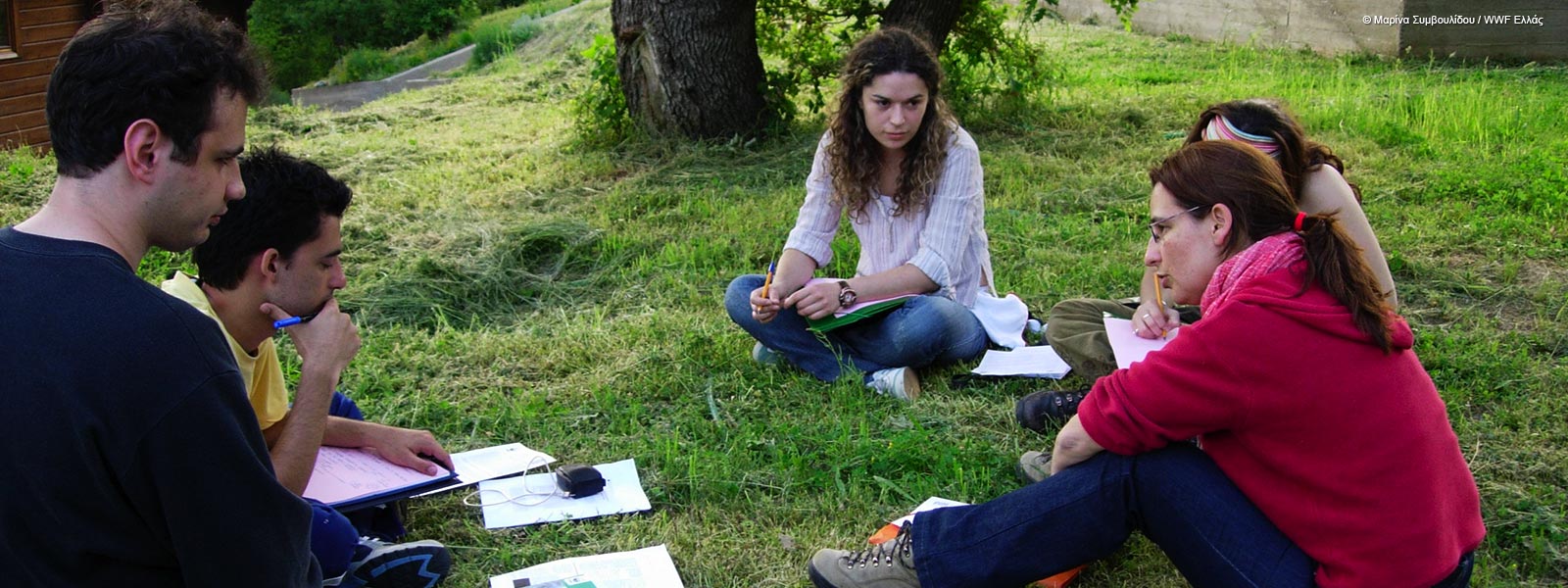
© M. Symvoulidou / WWF Greece
The system of governance that will create conditions for developing a living sustainable economy:
- complies with the law and respects the decisions of national and international courts;
- is simple, cohesive and clearly structured;
- accounts with transparency and clarity for the ecological and social sustainability of the economy in comprehensive regular reports and on the basis of indicators;
- promotes international cooperation and actively participates in formulating policies to safeguard and ecologically manage natural capital and to develop sustainable economic activity within the planet’s limits, providing the guarantee of a state that acts as a good international citizen;
- establishes a framework for market and production development through constant deliberation with all interested parties, supporting their effective participation in determining the course of the country’s economy;
- formulates policies with clear, unambiguous and equitable rules, eliminating any preferential treatment of individuals, businesses or social groups.
The fields where cohesive intervention is necessary are:
Political commitment: The objective is cross-party political commitment to incorporate the environmental dimension and the priority of ecological footprint reduction in all policies and to consistently uphold environmental legislation.
Participation: The aim is to develop a framework and solid structures for the broad participation of an environmentally aware society in the political and legislative process. The establishment of participatory structures is a necessary (though not sufficient) condition for countering political asymmetry.
Efficient and transparent administration: The objective is efficient, transparent and cohesive public administration that serves as a guardian of the implementation of environmental law and as a mechanism of enactment of necessary policies.
Cutting the links between public administration and political parties to facilitate the uniform, time-consistent and politically impartial implementation of policies and legislation is a main priority. Reducing the number and levels of political leadership positions in ministries is necessary for achieving a satisfactory degree of political independence for public administration. Within this context, it is necessary to consider the restriction of political leadership to the level of deputy minister and the appointment of general secretaries with a five-year term by a cross-party parliamentary committee.
Equally important is the establishment of an integrated e-governance system, which will cover all levels of public administration and allow the reduction of the bureaucratic load on citizens and businesses while fostering the traceability of the progress of pertinent decisions. Concerning particularly the implementation of environmental legislation, e-governance is necessary to guarantee transparency and faster administrative decision-making.
Knowledge: The objective is to develop the knowledge tools concerning the environment and physical space that are vital for both citizens and administration, such as forest maps, a biodiversity inventory and Natura 2000 habitat and species mapping.
Emphasis needs to be placed on the following critical fields of information:
- geospatial data recording,
- urban and spatial planning data recording,
- development information,
- ecological management,
- administrative activity monitoring and open environmental research data.
Efficient control: The aim is to develop a cohesive and efficient mechanism to control the implementation of environmental legislation, to eradicate environmental crime and to promote proactive environmental compliance.
Upgrading the Special Environmental Inspectorate to an independent and self-sufficient Environmental Inspectorate Authority is of paramount importance. Creating a framework for voluntary compliance with the best available practices and standards of environmentally responsible business conduct is also necessary.
Legal certainty: The objective is to achieve legal certainty for the development of a living and sustainable economy, mainly through consistent codification, the eradication of clientelist practices, the full incorporation of the environmental dimension in all legislation and open and substantiated deliberation.
Transparent, socially accountable, participatory and legally certain governance
Based on our firm view that both the conservation of natural capital and the healthy development of entrepreneurship are inextricably linked to legal certainty and jurisdictional clarity, our priorities are:
- environmental integration throughout the directly or indirectly pertinent legislation;
- the constant and cohesive codification and simplification (through the abolition of outdated, inactive or excessive regulations) of legislation;
- the abolishment of tailor-made regulation practices;
- the organization of steady and permanent deliberation structures;
- the comprehensive assessment of the expected impact of legislative initiatives;
- organized, easy, up-to-date and open access to case law and standing legislation;
- the reduction of the administrative load emanating from regulations;
- the enhancement of the environmental inspection system, starting with the founding of a self-sufficient and independent Environmental Inspectorate Authority;
- the prompt completion of critical environmental knowledge tools, such as forest maps and geospatial and urban planning data records, and their open release to the public;
- the improvement of transparency tools concerning the administration and the legislative process, such as the “Cl@rity” Program and online deliberation websites.
Share this



